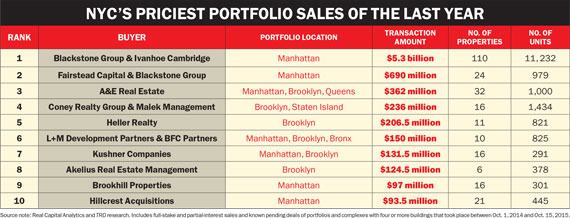The market for big packages of multifamily buildings may have less sex appeal than the fancy condos adorning Billionaire’s Row, but the sector is going strong. Institutional investors, family firms and affordable-housing players are all increasingly competing to get in on the action.
Speaking to that appeal was last month’s blockbuster $5.3 billion purchase of the sprawling apartment complex Stuyvesant Town-Peter Cooper Village by the Blackstone Group and Ivanhoe Cambridge. But while that deal captured headlines, there are many others a notch, or several notches, just below.
The numbers bear that out. The dollar volume of multifamily portfolios in the city has been steadily increasing since 2010, according to data from commercial firm Ariel Property Advisors. The first three quarters of 2015 saw $4.6 billion in closed portfolio deals, up from $2.7 billion over the same period in 2013.
The reasons for the boom in this sector are simple: While there’s still plenty of foreign and domestic money flooding into condo development in the city, buying up big packages of multifamily buildings offers investors a safer alternative and an avenue to diversify their holdings. In addition, rents have been skyrocketing and more corners of the city are gentrifying, opening up investment opportunities. Those realities have proven particularly appealing for institutional players recently.
“Some of our institutional clients are bidding and buying in neighborhoods like Flatbush and East New York that they would not have even considered seven to 10 years ago,” said Meridian Capital Group’s Lipa Lieberman, who was a broker on the $236 million “Kings and Queens” portfolio deal while he was at Eastern Consolidated. “Back then, they may not have considered Brooklyn at all.”
Marcus & Millichap’s Peter Von Der Ahe, who co-brokered a Kushner Companies portfolio deal for 16 buildings, said the market has “broader appeal” than it did 36 months ago.
This month, with help from Real Capital Analytics, The Real Deal ranked the priciest New York City multifamily portfolio (and mega-complex) sales and known pending deals over a 12-month period through mid-October.
Here’s a close-up look at how the priciest deals unfolded.
Stuyvesant Town-Peter Cooper Village
Buyer: Blackstone Group & Ivanhoe Cambridge
Price: $5.3 billion
Date: October 2015 (in contract)
This monster in-contract deal for Manhattan’s biggest apartment complex was the priciest portfolio transaction in the city — by a long shot. That’s despite the fact that it fell just short of the $5.4 billion record-breaking price Tishman Speyer paid in 2006 before losing the 80-acre site during the downturn.
The 110-building complex, which is owned by CWCapital Asset Management, holds a massive 11,232 rental units.
As part of the deal, Blackstone and Canadian investment giant Ivanhoe Cambridge pledged to keep about 5,000 apartments below market rents for at least the next 20 years. In exchange, the city, which was involved in negotiations because of how much middle-income housing was at stake, will provide a $144 million low-interest loan and waive $77 million in mortgage recording taxes.
The buyers-to-be have vowed not to convert the site to condos or build new towers. However, they have the city’s permission to sell more than 700,000 square feet in unused development rights.
Blackstone — which is buying the property through Blackstone Property Partners, a fund launched last year — and Ivanhoe are each putting up $1.3 billion for the deal, sources said.
City Hall officials lauded the deal as an end to the complex’s precarious state since Tishman Speyer and its partner, BlackRock, defaulted on $4.4 billion of debt in 2010.
Last year, CWCapital, which took control of the complex after the default, tapped Eastdil Secured’s Douglas Harmon to market it for sale.
Jonathan Gray, Blackstone’s global head of real estate, called the complex an “irreplaceable asset” at a press conference last month.
“I think it goes to the return expectations we have,” he said.
Caiola portfolio
Price: $690 million
Buyers: Fairstead Capital & Blackstone Group
Date: September 2015
Part of selling involves saying goodbye. After legendary building owner and developer Benny Caiola died at age 79 in 2010, his children inherited the task of determining the fate of his many buildings. Sources said it was an emotional journey.

Aliza Avital-Caplan
The Italian plasterer founded his real estate firm B&L Management Company in 1980 and went on to amass (and develop) nearly three dozen buildings.
Caiola’s four children and his wife were reluctant to sell the largest of the firm’s holdings: a coveted 24-building, 979-unit Manhattan package, which is scattered through Chelsea and the Upper East Side.
“When it came to pulling the trigger, they couldn’t do it,” said Aliza Avital-Caplan, a broker at Emerald Equities NYC, who has been working with the family since 2007 and has brokered several of their sales, including a 210-unit Chelsea rental at 120 West 21st Street for $139 million.
In 2011, the family decided to test the waters via word of mouth.
As the market heated up, the family offered a “verbal exclusive,” sources said, to sell the 24-building package to Joseph Sitt’s Thor Equities, which signed a “soft” contract in January 2015 for about $800 million. Thor backed out this past spring, though another source pointed out that a “soft” contract is “not real.” Still, after the blow, the family reconsidered holding the asset.
Avital-Caplan, formerly of Eastern Consolidated, then met with Will Blodgett, a principal at Fairstead Capital, a family firm that owns $2.3 billion in New York City properties with more than 4,750 apartments. The process suddenly accelerated. “Will was very real and honest and had a connection [with the family] from the get-go,” she said.
Just two weeks after that meeting in May, Fairstead made an offer, according to Blodgett.
Stephen Siegel, a Fairstead principal and the chairman of CBRE, said the family was satisfied the portfolio was being put in good hands.
“The emotional aspect was alleviated by the care and value that Will vowed to deliver to the buildings,” he said.
Avital-Caplan said the process could not have gone smoother. “It took Fairstead longer to negotiate a $50 million deal than to close a deal for $690 million,” she said.
Fairstead brought in a big gun as its partner: Blackstone. By September, the duo had closed on the deal.
With a $592 million loan from Annaly Capital Management, the transaction is more than 85 percent leveraged — higher than the typical 60 percent to 70 percent.
B&L Management Company still owns more than six buildings in the city and is also developing in White Plains, Avital-Caplan said.
Siegel said Caiola’s sons Alfred and Luigi, who head the business, are now focused on starting fresh and “building their own legacy.”
Dermot Company portfolio
Price: $362 million
Buyers: A&E Real Estate
Date: February 2015
Douglas Eisenberg, who runs Midtown-based firm A&E Real Estate, capitalized on another multifamily titan in the midst of downsizing — the Dermot Company. In the wake of founder William Dickey’s retirement earlier this year, Dermot was shedding all of its non-new construction, rent-stabilized assets in the city. “The move was to migrate toward the luxury space,” in Manhattan, Brooklyn and Queens, said Dermot CEO Stephen Benjamin.

Stephen Benjamin
Dermot’s 32-property sale to A&E, which included more than 1,000 units assembled over a decade, leaves Dermot with only four buildings. Among its remaining properties is the 43-story, 616-unit rental under construction at 21 West End Avenue. Despite the sizable drop in holdings, Dermot retains nearly $2 billion in assets under management and development, Benjamin said.
Rosewood Realty Group’s Aaron Jungreis, who brokered the Dermot portfolio deal and two others on TRD’s top 10 list, said the market was on an upward trajectory when the company began selling. “At the time, [Dermot] felt it was at an all-time high,” he said. But he added: “If they had sold now, they could possibly have gotten another 5 percent.”
A&E, which sources said has assets of about $2 billion and owns 100 buildings, has been active in northern Manhattan and actually bought four Inwood buildings from Dermot in 2013.
Eisenberg was formerly a principal of his family business Urban American Management, still headed by his father Philip. He left in 2011 to start A&E.
“Kings and Queens”
Price: $236 million
Buyers: Coney Realty Gr. & Malek Management
Date: March 2015
This large package of buildings once brandished the epic nickname “Kings and Queens.” But by the time it sold in March, there were no longer any Queens buildings in the 16-building, 1,400-unit portfolio.
The $236 million purchase by Peter Rebenwurzel’s Coney Realty Group and David Malek’s Malek Management also marked the second sale for the package since 2007.
The sellers — Urban American Management and equity partner Fannie Mae — bought the portfolio in 2007 for $251 million from the LeFrak Organization. At the time, it consisted of nearly 2,000 units. Today, all of the properties are in Brooklyn with the exception of one Staten Island complex.
Rebenwurzel, who was born in Budapest, is a multifamily investor who was very much out of the spotlight prior to this purchase, despite his firm’s sizable holdings. Before the deal, Coney Realty Group owned about 5,000 rental units across more than 100 properties citywide.
“Rebenwurzel made a bigger splash with Kings and Queens, but he’s been around forever,” said Ariel Property’s Victor Sozio, who was not involved in the deal. “His strategy is workforce housing locations, where he is penciling out five-to-10-year exits.”
The largely rent-stabilized properties are in lower-income neighborhoods such as East Flatbush and Brownsville.
This deal, however, could have significant upside.
According to Meridian’s Lieberman, some tenants were paying as much as 30 percent below market rents before the sale.
A&E Portfolio
Price: $206.5 million
Buyer: Heller Realty Brooklyn
Date: March 2015
Just a month after snapping up the 32-building Dermot Company portfolio, A&E unloaded these 11 Brooklyn buildings for $206.5 million.
The package, which was picked up by Heller Realty, a Midtown East-based family firm, consists of 821 apartments, largely in Flatbush and Brighton Beach.
A&E acquired them over the last four years for a combined $125 million. The quick turnaround paid off given the $206.5 million it sold the portfolio for.
Led by Ben Heller and Arnold Simon, Heller owns dozens of rental buildings in prime Manhattan areas such as the Upper West Side and the East Village. Sources said Heller’s holdings are close to $1 billion.
Attempts to reach the firm were unsuccessful.
NYCHA portfolio
Price: $150 million
Date: December 2014
L+M Development Partners and BFC Partners acquired a 50 percent stake in all of the Section 8-subsidized buildings owned by the New York City Housing Authority.
This deal is the sole partial-interest purchase to make the list, but it’s a rare example of a large-scale preservation project in the multifamily portfolio game.
It was announced as housing authorities across the country are wooing private investors to help redevelop aging properties in the face of federal funding cuts.
Earlier this year, NYCHA Chair Shola Olatoye said it would have been “negligent” not to take the deal, adding that “the conditions that exist were truly deplorable,” The Daily News reported.
Under this deal, the U.S. Department of Housing and Urban Development is covering the difference between the tenant’s rent and the market-rate rent, a payment that comes out to about 30 percent of the renter’s income.
L&M jumped on the opportunity. “We’re able to keep the units affordable, while we pay a market-rate price, in areas that are hot and rapidly appreciating,” said Rick Gropper, L&M’s director of development.
L&M, which is headed by Ron Moelis, and BFC, which is headed by Donald Cappocia, Joseph Ferrara, and Brandon Baron, secured a $300 million loan from Wells Fargo last year.
All 825 NYCHA apartments, which span three boroughs, are undergoing a makeover.
The developers, selected through a competitive bidding process with the city, are at work on an $80 million renovation of the units that span 10 buildings in six complexes, slated to be complete by June 2016. The renovations will include kitchens and bathrooms as well as the replacement of electrical systems and windows. It will not require tenants to move out. The housing authority, which has owned and operated the apartments since the early 1980s, continues to own the land.
L&M and BFC are also jointly developing the 1.9 million-square-foot, mixed-use Essex Crossing project on the Lower East Side. And BFC is behind the 350,000-square-foot outdoor mall known as Empire Outlets on Staten Island.

